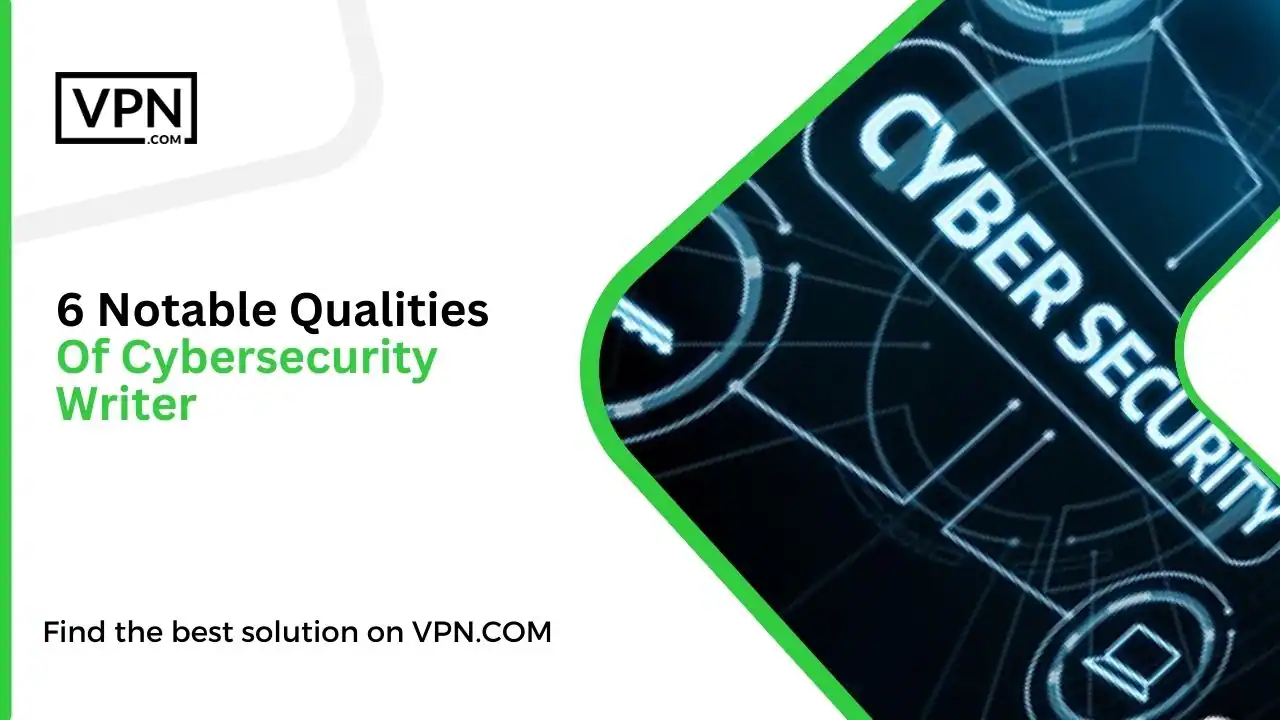What Makes A Best Cybersecurity Content Writer in 2024?

You might be wondering that all writers are the same, but do you know that a novel writer is different from a ghost writer, and just like that there’s a huge difference between a normal writer and a cybersecurity writer.
In this practical guide, we’ll discuss what technical writer cybersecurity are, what they do, why businesses need them, how much they make, and what tips you should follow to become the best cybersecurity writer.
What Is A Cybersecurity Writer?
A cybersecurity writer knows the latest trends, threats, and solutions in cybersecurity. They translate complex cybersecurity concepts into simple terms for easier understanding and create strategic plans & security policies.
With the help & expertise of a freelance cybersecurity content writer, your employees & customers can take a sigh of relief before, during, and after a cyber attack takes place.
Every Cybersecurity agency and corporate offices needs a cybersecurity technical writer to collect data, address end user documentation gaps, tailor communication strategy to educate the employees about the latest cybersecurity threats & their solutions.
What Does A Cybersecurity Technical Writer Do?

A cybersecurity content writer produces case studies, articles, whitepapers, blogs, and presentations. They educate about the latest cybersecurity trends and help prevent future attacks. They also manage outdated documentation and present data uniquely.
They, as a technical writer in cybersecurity, create, edit, maintain, and manage the outdated documentation to create new case studies & presentations to present the data in a unique and advanced way. This ensures their end consumers can grasp the depth of their work & services, and become more eager to learn about the products & services on offer.
Why Do Businesses Need A Cybersecurity Writer?
No one can deny the importance of a freelance cybersecurity content writer, especially businesses who want to hire a cybersecurity technical writer to focus on the sales & production of their products & services rather than wasting their time to work on unfamiliar security measures.
Big Companies hire the cybersecurity technical writer to increase security solutions, and ensure that the proper tools & practices are performed correctly according to the unique needs of the businesses.
Furthermore, Cybersecurity Writers can keep your business up to date on the latest trends & techniques to prevent the cybercriminals from targeting you and your company’s sensitive data & private data of the employees of your company.
The biggest reason why people are hiring the cybersecurity writers is that they help to educate your employees about the best cybersecurity practices like using unique & strong passwords, keeping the softwares & hardwares up to date, being cautious when opening spam emails & clicking on the links.
How Much Does A Cybersecurity Technical Writer Earn Annually?

A normal cybersecurity technical writer earns around $70,000 to $80,000 per year, and according to the Bureau of Labor Statistics, the demand for technical writers will increase by 8% in the upcoming years.
And if you’re familiar with the concept of demand & supply, you can assume that their salaries will also increase with the time, and if you’re thinking about using AI instead of a writer, No generative AI is up to date with the latest trends of any industry, which could be a drawback for companies.
6 Notable Qualities Of Cybersecurity Writer

They should have technical writing styles and documentation skills, high attention to detail, precision and conciseness in their writing, the ability to comprehend technical concepts, skills in planning, composition, and analysis, and a love for learning.
Let’s take a look at the notable qualities & qualifications of a cybersecurity writer to see which 6 tasks he/she must do to perform their role and duties carefully:
Technical Writing Styles and Documentation
Every Technical Writer has the ability to write about a specific topic in depth so their potential customers could get what they’re looking for so they can make an informed decision based on the information you provide.
They can easily create security policy, audit documents, legal code, business plans & penetration test results so their readers can understand the information they want to convey to their customers.
And suppose if their writing style isn’t compelling & easy to understand then it will create confusion for the readers, interrupt the project success, and raises legal liability of the organization they work for.
High Attention to Detail
A good cybersecurity technical writer will not give you a chance to doubt their work, and explain all the concepts of their topic, and even answer the questions you have in your mind in the FAQs to educate the readers about a certain topic, product, service, or anything.
They use easy words and simple sentence structure so even a little kid could understand what they want to convey, and try to use tables & graphs for the readers so they could also get what the writer wants to convey.
Most companies when they launch a new product take help from their technical writers to create a compelling product description, long form articles & blogs, short copies for the social media engagement, and much more.
Precision and Conciseness
Precision & Conciseness is another important quality or the most crucial qualification factor when it comes to “what makes a great cybersecurity writer” especially in 2023 where readers or potential customers want to know each & every detail about a “VPN” before they consider it for their personal & business usage.
If you precisely put the information on the graph, represent the pros and cons in the form of tables, highlight your important points by making them handings, bold or italic the important lines–You can’t imagine how these little acts can make you a great cybersecurity writer.
Ability to Comprehend Technical Concepts
As we all know, people who are not a part of the cybersecurity related market don’t consider cybersecurity as a threat, they don’t know how vulnerable they are until a cyber maniac sends them an email or vulgar photos of them which they thought were safe on their phone.
It’s your responsibility as a cybersecurity technical writer to educate your audience about how the hackers attack the systems of ordinary people & business corporations, what measures they should take to prevent these attacks, which tips they should follow to remain safe when browsing the internet, etc.
Planning, Composition and Analysis
Why do you think that you like this article so far? Was it because it was better planned, composed or analyzed? The fact that you read the article till the 5th heading is proof that this article made you curious about what’s coming next.
As a Freelance Cyber Security Content Writer, you have to plan & compose a long, informative, interesting and beautiful piece of article to educate your audience about the latest trends of the industry & offer the solution to the problems they’re facing.
Every Organization must have an editorial process where the technical content writers proofread the whole book & article to ensure that there’s no grammar mistake, wrong information & section, and more.
Loves to Learn
Last but not least, If you want to become a freelance cybersecurity content writer, but not want to learn something new or you can’t accept the fact that your junior writes better than you–You can’t become a cybersecurity writer.
Sometimes, you have to write a long piece of article on something which is not available on the internet or doesn’t have enough information about so technical writers find valuable resources or check out the product or service on behalf of their organization to get what potential customers need the most.
Cybersecurity trends, patterns, problems, challenges & solutions change every year so it’s natural to consider that the new testing products, research topics, interview subjects & documentations will also come to life with the help of the cybersecurity writers & their hard work.
Conclusion
We hope after reading this whole article, you’re now sure of whether you can become a good cybersecurity content writer or not, and if you want to become one, we have already described to you the qualities or qualifications you should have to succeed in the industry.
There are also many other qualifications, but we think if you have the above ones, you can enter and dominate your industry on a whole other level.
And if you have any other question or want to become a cybersecurity writer but don’t know where to start, feel free to talk to us, and comment down your thoughts and queries or you can simply send us an email for more information. We’ll feel proud if we could help a customer in need.
Customer Reviews for NordVPN: In-Depth Review, Tests, and Stats

Connection issues with MLB.TV
May, 2 2023

Prompt customer service
May, 6 2023

I would highly recommend
December, 15 2023
